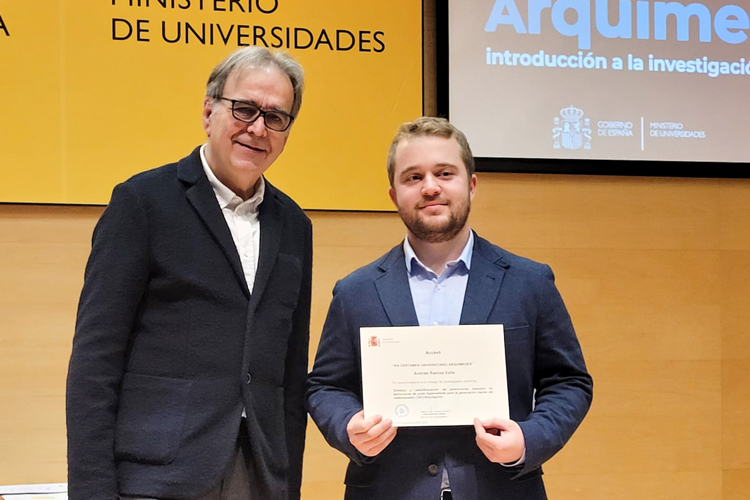The 19th Archimedes Introduction to Scientific Research University Contest, organized by the General Secretariat of Universities, has awarded Andrés Ramos, an IQS alumnus, for his Master Thesis research in the Master’s Degree in Pharmaceutical Chemistry.

The 19th Archimedes Introduction to Scientific Research University Contest, organized by the General Secretariat of Universities, has awarded Andrés Ramos, an IQS alumnus, for his Master Thesis research in the Master's Degree in Pharmaceutical Chemistry.
The award ceremony took place during a formal event held in the Ceremony Hall at the Ministry of Universities, with the presence of Eloísa del Pino, President of the High Council for Scientific Research, and Joan Subirats, Minister of Universities, among other attendees.
"This award represents a wonderful conclusion to the research work that we carried out during my Master Thesis (2020-2021) in the BiSI Bonds Group, with Dr Ana Belén Cuenca, and the Radiochemistry and Molecular Imaging Group at CiC-Biomagune (San Sebastian) with Dr Jordi Llop," said the winner.
The award-winning IQS research project, entitled "Synthesis and radiofluorination of precursors based on hypervalent iodine structures for the rapid generation of the radiotracer [18F]-fluoroquine" was evaluated under the following criteria: original topic, overall quality of the work, approach to the objectives, design of the research strategy, methodological difficulty, development of the work, impact of the work, and repercussions on the student's discipline and society.
Ramos thanked his supervisors and members of the research groups, highlighting that “the best thing about the award is the satisfaction of seeing this external recognition for the project in a nationwide contest. The best part of the project was all the learning, training, and experience I was lucky enough to gain during the time I spent with Ana Belén and Jordi.”
Moreover, he also stated that "when we were conducting the research, our efforts and solid organization enabled us to continuously advance to the point where we fulfilled the proposed objectives and produced really interesting results. In addition, the cross-disciplinary nature and theme of the project made it possible for me to work in different areas, such as the advanced organic synthesis of hypervalent iodine compounds and the isotopic marking of these compounds to generate radiopharmaceuticals that are applied together with nanotherapies in imaging techniques."
Teaching & Research
The objectives of the Archimedes Introduction to Scientific Research University Contest are to promote the combination of teaching and research in Spanish universities, to encourage the incorporation of students into the field of research by awarding prizes to original scientific and technological research projects carried out by students, and to involve teaching and research bodies in student mentoring. In the latest edition of the contest, 567 projects from 65 different universities were presented, representing a significant and realistic sample of the quality of research being carried out at both public and private Spanish universities.
The following is the abstract of the award-winning research project "Synthesis and radiofluorination of precursors based on hypervalent iodine structures for the rapid generation of the radiotracer [18F]- fluoroquine":Fluorine-18 (t1/2 = 109.7 min) is one of the most widely used isotopes in radiopharmaceuticals for proton emission tomography (PET) molecular imaging. However, there is a problem with the 18F-fluorination of non-activated arenes (present in most drugs). The use of groups based on hypervalent iodine (III) has opened up an opportunity for the development of radiofluorination methodologies in these arenes. The complexity of obtaining them and the poor compatibility with functional groups require selective and effective methods for the synthesis of these oligodendrocyte precursors (III). In addition to its antimalarial use, chloroquine can be added to nanoformulations to promote lysosomal escape and increase its effectiveness. Obtaining one of these marked molecules (18F-fluoroquine) can expand the use of these compounds and give them theranostic activity. In this project, the total synthesis of a series of hypervalent iodine compounds of the ilide type, based on the skeleton of chloroquine, has been designed, prepared, and tested as radiofluorination precursors to obtain the 18F-fluoroquine tracer.










